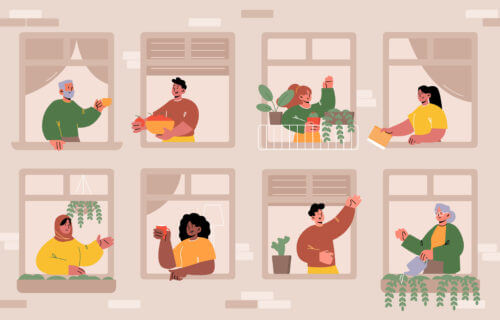NEW BRUNSWICK, N.J. — Older adults often bemoan the loss of the good old days when neighbors were friends instead of strangers, and everyone in the neighborhood left their doors unlocked. While home security is one thing, interesting new research out of Rutgers University has found that feeling connected to one’s neighbors appears to promote better health outcomes.
Study authors report strong neighborhood connections mitigated the negative impact of living alone on death rates among older adults. While this work is somewhat limited in scope, the results still suggest perceptions of trust and connection within one’s neighborhood may help reduce death risk.
This project focused on neighborhood cohesion among Chinese Americans living within the greater Chicago area, and whether these connections would reduce the impact of living alone on early death risk.
“Older Chinese Americans who lived by themselves in neighborhoods with low cohesion were much more likely to die earlier than those who lived by themselves in neighborhoods with strong cohesion,” said Yanping Jiang, author of the study and faculty member at the Center for Population Behavioral Health at Rutgers Institute for Health, Health Care Policy and Aging Research, in a media release.
About 27 percent of people aged 60 or older live alone in the USA, according to the Pew Research Center. Living alone has been linked to a number of adverse health outcomes such as heart disease, depression, premature death, dementia, and poor overall biological health. So, researchers believed it important to identify which factors may or may not help reduce the negative effects of living alone.
‘Enhancing neighborhood cohesion a promising way to reduce early death’
Study authors investigated if perceptions of trust and connection among neighbors had an impact on the death risk among that population. Subjects living alone, and reporting minimal interactions or connections with their neighbors, had a 48.5 percent increased risk of death in comparison to their peers living with other people. Meanwhile, people who lived alone and reported strong cohesion with their neighborhood displayed death risks very similar to those living with others.
Establishing a clearer understanding of how different types of neighborhoods may influence locals’ health outcomes can help in the creation of new social policies and public health initiatives aimed at fostering better, more inclusive neighborhood environments.
“Our findings show the particular challenges faced by older adults who live alone in communities with little interaction or connection,” concludes Jiang, who is an instructor at the Rutgers Department of Family Medicine and Community Health. “Enhancing neighborhood cohesion may be a promising way to reduce early death for older adults who live alone.”
Future studies should focus on additional factors involved in neighborhoods, and how they may or may not influence the health of older adults. On an individual level, we can all do our part. Consider being just a little friendlier to your neighbors, especially those who live alone.
The study is published in Social Science & Medicine.

In my cul de sac, here, in Castle Hill, Australia, my neighbours are bastards, and I wouldn’t pee on them if they were on fire!